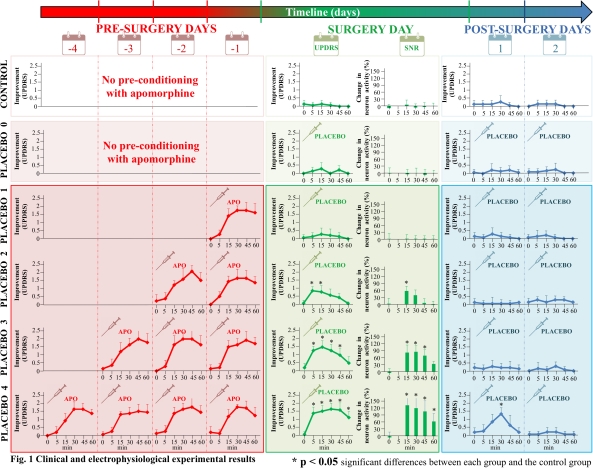Session Information
Date: Wednesday, June 22, 2016
Session Title: Imaging and Neurophysiology
Session Time: 12:00pm-1:30pm
Objective: To see whether a placebo response requires pharmacological pre-conditioning with apomorphine.
Background: Placebos have been found to affect the patient’s brain in a number of conditions, such as pain and motor disorders [1]. For example, in Parkinson’s disease, a placebo treatment induces a release of dopamine in the striatum and changes the activity of neurons in both thalamic and subthalamic nuclei [2].
Methods: We recorded from the motor thalamus during the implantation of electrodes for deep brain stimulation and analyzed the placebo response at the level of single neurons and from a clinical point of view.
Results: We found that placebo administration for the first time induces neither clinical nor neuronal improvement. However, this lack of placebo responsiveness could be turned into substantial placebo responses following previous exposure to repeated administrations of apomorphine. In fact, as the number of apomorphine administrations increased from 1 through 4, both the clinical response and the neuronal activity in the ventral anterior and anterior ventrolateral thalamus increased. After 4 apomorphine exposures, placebo administration induced clinical responses that were as large as those to apomorphine, along with long-lasting neuronal changes. These placebo responses following 4 apomorphine administrations lasted for at least 24 hours, but they disappeared completely after 48 hours  .
.
Conclusions: These data indicate that learning plays a crucial role in placebo responsiveness, turning placebo nonresponders into responders, and suggest that these effects can be exploited in the clinical setting. References: 1. Finniss DG, Kaptchuk TJ, Miller F, Benedetti F (2010). Placebo Effects: Biological, Clinical and Ethical Advances. Lancet, 375: 686-695. 2. Benedetti F, Colloca L, Torre E, Lanotte M, Melcarne A, Pesare M, Bergamasco B, Lopiano L (2004). Placebo-responsive Parkinson patients show decreased activity in single neurons of subthalamic nucleus. Nature Neuroscience, 7: 587-588.
1st Congress of LIMPE-DISMOV Academy, Turin (Italy), September 28-30, 2015.
To cite this abstract in AMA style:
E. Frisaldi, E. Carlino, L. Giudetti, A. Pampallona, M. Zibetti, M. Lanotte, L. Lopiano, F. Benedetti. Increasing placebo response in Parkinson’s disease through apomorphine pre-conditioning [abstract]. Mov Disord. 2016; 31 (suppl 2). https://www.mdsabstracts.org/abstract/increasing-placebo-response-in-parkinsons-disease-through-apomorphine-pre-conditioning/. Accessed April 20, 2025.« Back to 2016 International Congress
MDS Abstracts - https://www.mdsabstracts.org/abstract/increasing-placebo-response-in-parkinsons-disease-through-apomorphine-pre-conditioning/
